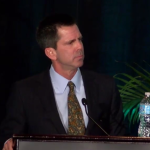The lead plaintiff in a lawsuit challenging the nation’s largest private school choice program and an advocate who helped establish it squared off Wednesday on Southwest Florida public radio.

The rare public exchange between Joanne McCall, the president of Florida Education Association, and John Kirtley, the chairman and founder of Step Up For Students*, came the week after the case was argued in a state appellate court. The full WGCU broadcast can be heard here.
A key issue at this stage of the case is whether the plaintiffs adequately alleged that the tax credit scholarship program, which serves more than 78,000 low-income children, actually harms the plaintiffs in the lawsuit, or whether they just dislike it politically.
Kirtley pointed to multiple studies by state economists showing the scholarship program saves the state money. In recent years, as the program has grown by tens of thousands of students, per-pupil public-school funding has gone up, he said. If school districts suddenly had to absorb nearly 80,000 students, “per-pupil spending would go down.”
What’s more, public schools would have to build new space for them, at a time when many are struggling to handle existing growth. In fast-growing Central Florida, for example, WFTV recently reported that Osceola County expects to add 10,000 students in the next five years, and is hoping charter schools can help accommodate them. There are nearly 3,000 students in the district on scholarships.

McCall, however, said that statewide enrollment grows by about 30,000 students per year, and if the program is struck down, lawmakers will have time to fund new construction.
“If we win this, it will go to appeals, and we know that,” she said. “That will give the Florida Legislature plenty of time to figure out what to do.”
McCall said the scholarships create a “parallel system” that draws children and money away from traditional schools. That phrase comes directly from a 2006 lawsuit in which the union successfully challenged a private school voucher program that, unlike tax credit scholarships, was funded directly out of the public school budget.
“Florida is the no. 1 state in the country for school choice,” she said. “Kids can go to different school within their district, and now [state lawmakers] just passed it where they can cross county lines, so there’s all kinds of opportunities for parents to go within the public system.”
Kirtley said he supports charter and traditional public schools, but low-income families should have the same options as wealthier ones.
“I just worry about people who can’t make a choice because they don’t have enough money,” he said. “Parents who have the means exercise school choice, either by moving to a neighborhood that has the school that they like, or by paying for an alternative. … I only worry about those who don’t have the means to make that decision.”
*Step Up For Students publishes this blog and pays the author’s salary. It also helps administer the tax credit scholarship program.


